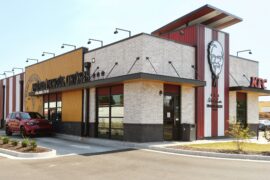JBS USA, which last week shut down its Greeley beef production plant in Colorado after several dozen workers contracted the novel coronavirus (SARS-Cov-2), this week announced the indefinite closure of its pork production facility in Worthington, Minnesota. The site employs more than 2,000 workers and processes 20,000 hogs per day.
According to a Fox 9 report out of Minneapolis, the United Food and Commercial Workers (UFCW) Local 663 confirmed 20 cases of Covid-19 at the plant. The Minnesota Department of Health subsequently reported that 26 JBS workers and five relatives of workers have tested positive for coronavirus infection.
“We don’t make this decision lightly,” said Bob Krebs, president of JBS USA Pork operations. “We recognize JBS Worthington is critical to local hog producers, the US food supply and the many businesses that support the facility each and every day.”

The plant has wound down operations, with a diminished staff still on the job to ensure existing product in the facility will be able to enter the food supply pipeline. The company has advised all non-active employees, who will continue to be paid during the plant closure, to follow Minnesota Governor Tim Walz’s stay at home order until returning to work is authorized.
“As we all learn more about coronavirus, it is clear that the disease is far more widespread across the US and in our county than official estimates indicate based on limited testing,” Krebs said. “We have taken aggressive actions to keep coronavirus out of our plant and keep this critical infrastructure facility operational. It is our hope that Governor Walz’s effort to implement more widespread community testing will help all of us better understand the measures we must all take to stop its potential spread. We must work together to defeat this common enemy.”
Since breaking out in the central China city of Wuhan late last year, the highly contagious virus has infected almost 2.3 million people and killed more than 170,000 worldwide. As of April 21 the death toll stood at 160 in Minnesota, where 2,567 confirmed cases have been recorded.
To protect the health and safety of workers, JBS focuses on keeping the virus out of its facilities. This can be more challenging in communities where the bug has taken hold. When Covid-19 is prevalent in the community, fear is heightened, absenteeism rises and the challenge of keeping the virus out becomes greater. When absenteeism levels become too high, facilities cannot safely operate.

JBS USA is a subsidiary of Sao Paulo, Brazil-headquartered JBS S.A., which is controlled by billionaire brothers Wesley and Joesley Bartista, operates more than 60 meat, poultry and prepared foods facilities across the United States. The Worthington pork plant is the company’s third operation in the United States to temporarily close this month, joining the Souderton, Pennsylvania beef production facility, which reopened on April 20, and the still shuttered Greeley beef plant in Colorado.
Hog Farmers Face Financial Crisis
Meanwhile, among many devastating economic impacts of Covid-19 is the plummeting of hog prices to plummet. This has resulted in a financial disaster for pork producers nationwide, who collectively face billions of dollars in losses for the remainder of the year.
The US Department of Agriculture (USDA) recently announced a Covid-19 relief package that includes $3 billion in planned agricultural product purchases and $1.6 billion in direct payments to hog farmers, including payment limitations of $125,000 per commodity and $250,000 per individual. Industry economists conservatively estimate that hog farmers will lose $37 per hog marketed, or $5 billion collectively, for the remainder of the year.
“We fear the lifeline so desperately needed will fall short of what is truly needed,” said Howard “A.V.” Roth, president of the National Pork Producers Council (NPPC) and a hog farmer from Wauzeka, Wisconsin. “While the direct payments will offset some losses for some farmers, they are not sufficient to sustain the varied market participants, including those who own hogs as well as thousands of contract growers who care for pigs.”






